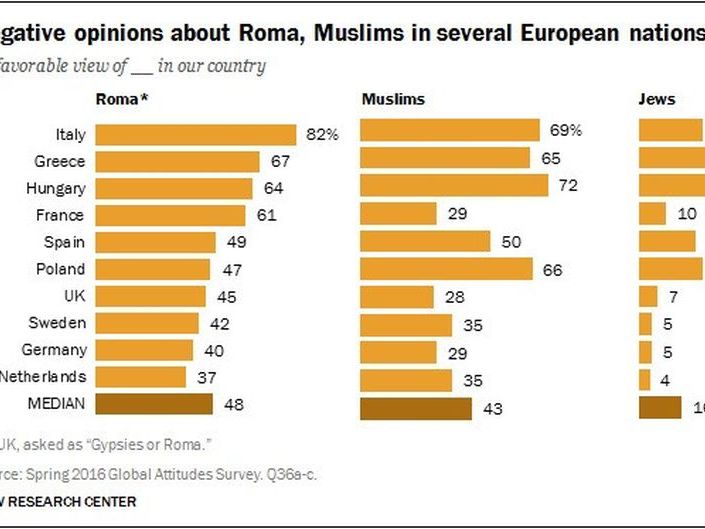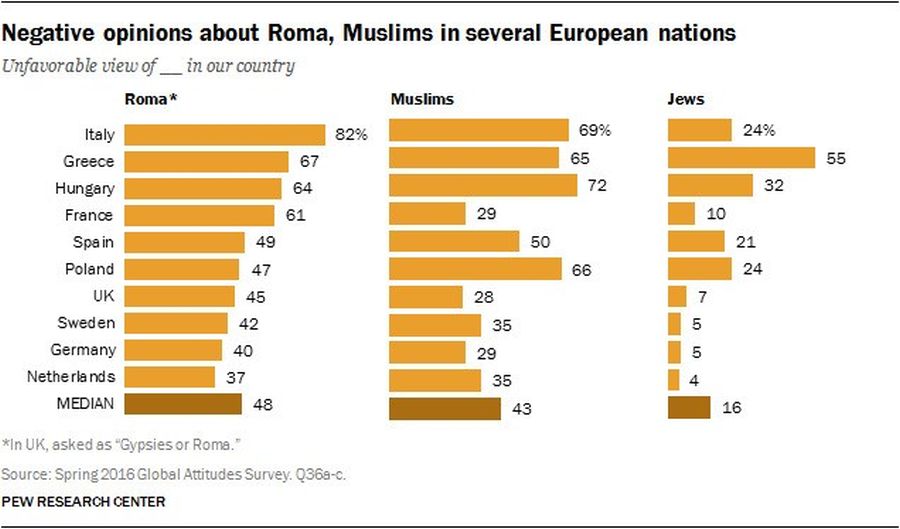Caravan Dwellers versus the Tiny Houses Movement

Do not ask a woman about her age, do not ask a man about his income, and do not ask Europeans their views on gypsies. Well, PEW Research Center did in 2016 through their attitudes survey, and it does not look good.

There are a number of traditionally itinerant or travelling groups in Europe who are known as ‘Travellers’ or ‘Gypsies’. ‘Gypsy’ is an exonym which refers to the Romani people (colloquially known as ‘Roma’) who are an Indo-Aryan ethnic group, which is the largest traditionally nomadic itinerant group living in Europe, and has diaspora populations in the Americas. The term gypsies are considered to be pejorative by some Roma people due to its connotations of illegality and irregularity. The Romani people identify as distinct ethnicities based in part on territorial, cultural and dialectical differences, and self-designation - including Sinti (who are themselves the second-largest itinerant group in Europe), Kale and Manush. The third-largest itinerant group are the Yenish travellers, an indigenous Germanic group. In the Netherlands, there are indigenous Dutch travellers - known as ‘Woonwagenbewoners’ (caravan dwellers) - whose origins lie within the Yenish travellers’ group. The woonwagenbewoners refer to settled people as Burgers (Citizens). The name Kampers (Campers) is considered discriminatory by Dutch Travellers.
On the 13th of July, 2018, the Dutch government presented a new policy, ending the former ‘extinction policy’ regarding Roma, Sinti and Travellers. The former policy was found to be discriminatory and violate human rights and limited the existence of their culture, their way of living and their freedom rights. The former policy had as main aim the extinction of caravan sites as living arrangements for woonwagenbewoners. Municipalities were given two options to execute this policy. The first, the removal of spots that were vacant or would become available, for example, due to the passing of an elderly resident, was named the “extinction policy” (uitsterfbeleid). The second was the “phasing out policy” (afbouwbeleid) to limit the number of spots per municipality to a national minimum per municipality. The new policy, active the 12th of Juli, 2018, tackles the issues of human rights violations. The policy includes the importance of housing, including cultural preferences, and the right of equal treatment. The caravan pitches are now a part of the public housing policy of municipalities, where space is given to the camper dwellers. Thereby current pitches must remain, and if necessary, new spots will be created with the help of housing cooperations. This way a home seeker has a chance of a pitch within a reasonable time.
At the same time, the Tiny House movement is on the rise. A tiny house is a residential structure under 37 m2 which is often mobile. The Dutch government supports the tiny house movement by (...). For example, the municipality of Groningen allocated an empty plot in Westpark to people building tiny houses who can occupy the plot for 10 years. At the same time, the camper dwellers feel like their culture is dying out because over the past years many pitches became unavailable because of the old policy. The tiny house movement is supported because governments want to stimulate their small ecological footprint, financial prudence and self-sufficiency.
There are similarities between mobile tiny houses and the trailers in which camper dwellers reside - they occupy a small amount of space, their inhabitants often live in a community which shares resources, and they are not built on the plot permanently. Although the trailers of camper dwellers were not built with the intention of having a small ecological footprint, they have a relatively small footprint compared to (regular size) houses. Yet there are many prejudices and stereotypes about camper dwellers, and their general negative identity is working against them, as can be seen in the former extinction policy.
Considering the negative connotations against camper dwellers and the positive connotations about the Tiny House movement, could the camper dwellers learn lessons from the Tiny House movement to incorporate into their lifestyle, to improve the way they are viewed in society and benefit from the same government support? The negative views on camper dwellers should be reshaped. Though changing the negative narrative of camper dwellers is a long process. As shown in the survey of PEW Research Center negative opinions regarding gypsies is quite severe. What is constructing those prejudices and stereotypes that people base their view on? If people are moving towards more environmentally conscious living arrangements, including camper dwellers, could we change our perceptions on camper dwellers by reconsidering what our opinions are based on? The negative perception of Travellers, Gypsies or Campers is one of the core forces blocking inclusiveness in society. This perception is based on prejudices, wrong information and negative attitudes. Perhaps the majority of us do not know any camper dwellers personally, though our opinion is already negatively oriented. So, where do we start? The issue of the Tiny House movement versus camper dwellers starts by ourselves; fostering inclusiveness by perceptions based on new experiences.
Links:
Lucassen, L., Willems, W., & Cottaar, A. M. (2015). Gypsies and other itinerant groups: A socio-historical approach. Springer
The Public Interest Litigation Project (PILP), (2014). Uitsterfbeleid woonwagenkampen. Accessed the 29th of October, 202 via https://pilpnjcm.nl/en/government-presents-new-policy-roma-sinti-travellers-mobile-homes
Winkler, B. (2010). “Change Perceptions: living in an inclusive society with Roma together”, proposal for a strategy of change. Accessed the 1st of November, 2020 via http://www.beate-winkler.net/dateien/change-perceptions.pdf


